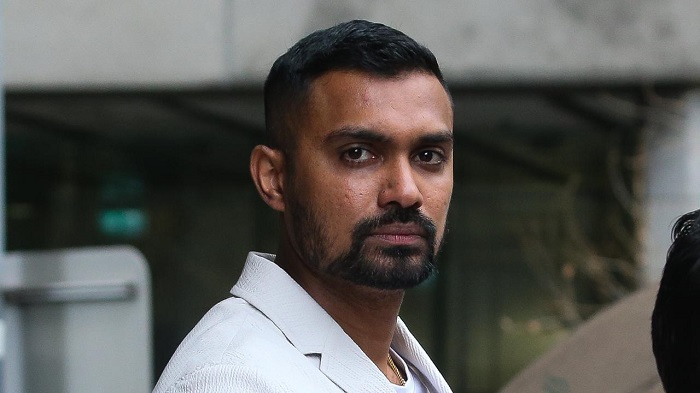
A judge has questioned the “focused” media attention on a Sri Lankan cricket star as he prepares to face a trial over allegations he raped a woman after an international sports event.
Danushka Gunathilaka appeared in Sydney Downing Centre District Court on Monday wearing a crisp white jacket and black pants as he applied for a judge-alone trial.
The cricketer has pleaded not guilty to raping a woman in her Sydney home while he was in the country for the T20 World Cup last year.
The court heard there had been significant media attention on the case since the international athlete was charged in November as he was preparing to fly home with his team.
Mr Gunathilaka has remained in Sydney since that date, waiting for the matter to be dealt with.
Mr Gunathilaka’s lawyer Murugan Thangaraj SC said there were more than 2.2m articles related to the case, but later revised his estimation to “many many articles across many many platforms”.
He argued some of the media coverage was “not entirely benign” and would damage his client’s standing with a potential jury.
Judge Warwick Hunt noted he had concerns about potential prejudice after seeing Mr Gunathilaka’s charges on the front page of a newspaper.
“I thought: ‘How can this man get a fair trial after all this publicity?’,” he said.
“I’m not suggesting it’s been unbalanced. It’s just been focused.”
However, the crown prosecutor argued the risk of prejudicing a jury was limited because the vast majority of the coverage had been straightforward.
“The publicity is not necessarily adverse, it’s just merely reporting the allegations,” she said.
The court was told Mr Gunathilaka was initially charged with three additional charges of sexual intercourse without consent, which were withdrawn in May.
Judge Hunt opined the judgment of some jurors may be clouded by the initial four charges, which may lead them to make assumptions about the cricketer or the alleged victim.
“Those kinds of speculations ahead of a trial only take place in this case because of the publicity,” he said.
“Because there’s been that regrettable legal chronology well reported, I do consider that the level of public media interest in the case may lead to a compromising of the accused’s interests at trial.”
He granted the cricketer’s application for a judge-alone trial, which is estimated to take five days.
Mr Thangaraj also made an simultaneous application to fast-track the trial so his client could return to Sri Lanka as soon as possible if cleared of the sexual assault charge.
He said it was necessary to expedite the proceedings so Mr Gunathilaka could resume his sporting career and to continue to financially support his family.
The court heard the cricketer has been diagnosed with severe clinical depression, which is exacerbated by the ongoing legal proceedings and media coverage.
“I’m persuaded the accused is under some psychological pressure that will continue to grow,” Judge Hunt agreed.
He set the trial down to begin on September 18 after the crown prosecutor lent her “unequivocal” support to expediting the proceedings.
Mr Gunathilaka has been stranded in Australia since he was arrested over the sexual assault allegations last year and told to surrender his passport.
Police allege the cricketer matched with a woman on a dating app and chatted with her a number of times online before they met on November 2.
The pair had drinks in the city before they went back to the woman’s home in the eastern suburbs of Sydney around 11pm, according to police.
Mr Gunathilaka allegedly ignored the woman’s request to “take it slow” and instead sexually assaulted the 29-year-old woman in her own home.
Police allege the cricketer engaged in “forceful” intercourse with the woman during which he choked the woman three times.
The woman told police she was “too afraid to do anything” and she had only consented to sexual intercourse with the cricket star if he agreed to wear a condom.
The woman later found the condom on the floor beside the bed, according to police.
The court was told the sexual assault charge related to “stealthing”, the non-consensual removal of a condom during sex.
“There is no suggestion that there was any lack of consent or that our client was aware of any lack of consent,” Mr Thangaraj told the court on Monday. (The Australian)
